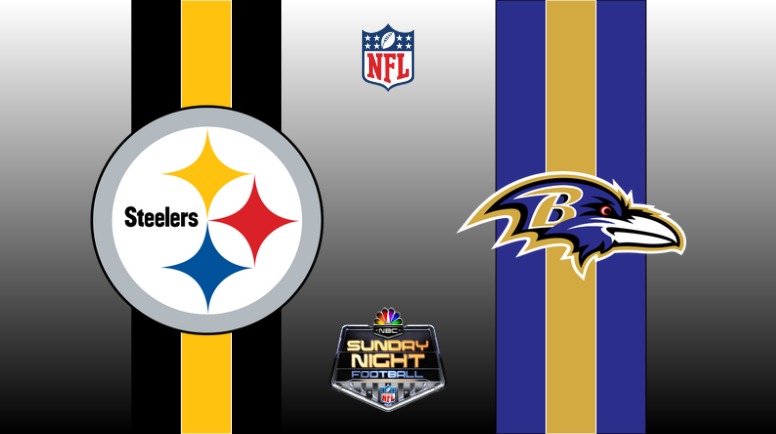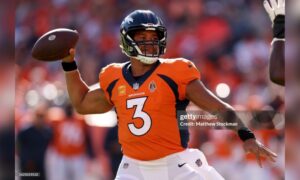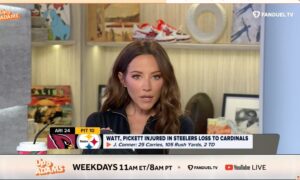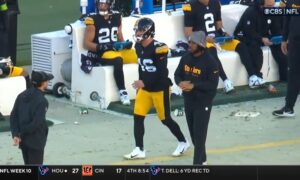So, obviously the topic of the day is what will not be happening tonight. The Pittsburgh Steelers were supposed to host the Baltimore Ravens for a big Thanksgiving AFC North showdown in primetime. That’s not happening after the Ravens suffered a coronavirus outbreak that has resulted in at least seven player positives and several more elsewhere in the organization.
There have naturally been a lot of questions about the circumstances involved and the various ramifications of this and that issue, some of which I have tried to field and respond to on Twitter, but anybody who knows me knows that character limits are not my friend, so I wanted to go into more detail about a few things.
First and foremost, why was the game postponed?
Simply put, it was the only reasonable and responsible reaction to a team receiving new player positives and three consecutive days with the knowledge that there may be more in the coming days. According to Dr. Allen Sills, the league is confident that it knows the source of the outbreak, and that they would need a few more days to reach a point of confidence that the spread was contained. The league already expects that more positives will come.
It’s important to mention that the postponement decision has nothing at all to do with the notion of competitive balance. If the league felt satisfied that the outbreak was contained, it wouldn’t matter if the Ravens had 15 players unavailable for the game. It would have still been played.
Postponement decisions are based entirely on safety. Just think about it for a second. Do you really think the league would want to scratch a holiday primetime game featuring one of its great rivalries, which is always a major draw, and just throw it out on a Sunday afternoon instead? Just to be nice to the Ravens? Of course not. They tried to avoid this at all costs, and decided that they could not do that safely. And that’s largely because this is a short week.
Who made the decision to postpone the game?
As is generally the case, it was Commissioner Roger Goodell. He has executive decisions on these sorts of things. The decision was made yesterday in conjunction with health experts, using the variety of tools that they have deployed, including tracking bracelets and even genomic tracking of the virus to help them determine the source.
Why wasn’t the 49ers game postponed when they also had positives before a Thursday game?
The difference in that game is that the league was confident that it identified the source and the cases and they were isolated, which is and has not been the case in Baltimore, which has resulted in growing numbers of cases both among athletes and staff, seemingly spreading from a asymptomatic strength and conditioning coach, who would have had contact with a number of individuals.
Will the Ravens be able to dress players they wouldn’t have because of the postponement?
The most likely scenario is that they will only get one of the eight total players back that they have placed on the Reserve/Covid-19 List. Of the eight, seven tested positive. Nose tackle Brandon Williams was the only one placed on reserve as a high-risk close contact. He would be eligible to play on Sunday, whereas he would not have tonight.
Players who test positive must stay on reserve for a minimum of 10 days if they are symptomatic at any point. If they are asymptomatic, then they must stay on reserve for a minimum of five days, but they must produce two negative PCR tests that occur at least 24 hours apart, and then be cleared for return in consultation with the league, in order to come off of reserve. It is exceedingly unlikely that anybody who tests positive for the first time will be able to begin testing negative four to five days later, in time to be cleared to play.
Who are the players we should not expect to see for the Ravens, and what is the impact of their loss?
RB J.K. Dobbins: Dobbins emerged as the Ravens’ lead runner in recent weeks, so his absence is significant, even more so in conjunction with Mark Ingram joining him on reserve.
RB Mark Ingram: Though he had missed time due to injury, Ingram was falling out of the rotation already, but with Dobbins also out, the Ravens are left only with Gus Edwards and Justice Hill at running back. Edwards has good career averages and will pose a threat, all the same.
DL Calais Campbell: While his absence is significant, there is a good chance that he would not have played anyway because he has been injured. It should be noted that fellow lineman Derek Wolfe has not been practicing due to an illness, so you have to wonder if he will be testing positive shortly.
OLB Pernell McPhee: Part of an edge rotation, McPhee is a seasoned veteran, but not a starter with Matt Judon and now Yannick Ngakoue. Tyus Bowser has developed as a valuable rotational piece as well.
C Matt Skura: Although he was benched last week after struggling with his snaps in the rain, head coach John Harbaugh did not commit to leaving him on the bench.
C Patrick Mekari: Here’s where things get interesting. Mekari is the Ravens’ backup center, and with both Skura and himself on reserve, you really have to wonder what they’re going to do. Rookie college free agent Trystan Colon-Castillo is listed as their third-string center. He was called up to the 53-man roster in mid-October as an injury replacement. He has not played a snap.
QB Trace McSorley: He was the first to test positive late last week. As the number three quarterback, he is almost always a healthy scratch.
What happens if the Ravens continue to receive new positives all the way into Saturday?
As the league has said on many occasions, every event is taken on a case-by-case basis. Whether or not the game could be played on Sunday with continued positives will depend upon the league’s level of comfort in their understanding of the containment within the organization.
It’s important to remember that the Ravens have simply not been in the building. They have not practiced. Meetings are virtual. So everyone has been isolating since Sunday as it is. Anybody who tests positive now will have been from contact from Sunday or earlier.
It then becomes a matter of whether or not the league is comfortable knowing who might still be at risk. We could theoretically see more players placed on reserve as high-risk close contacts. The bottom line is, we can’t know right now because we don’t know what the league knows.
What happens if the game actually does get postponed again?
This is pretty hypothetical, for obvious reasons, but we know that the league wants to avoid cancelling a game altogether. This would have to introduce an 18th week to the regular season, which we know is theoretically on the table. Playoff dates are fungible, and could be pushed back. It’s also possible that the game would not be played at a later date if it doesn’t have playoff implications.
Is it fair for the Steelers to have the game postponed?
Frankly, I don’t even like the use of the word ‘fair’ in this discussion. I don’t think fairness matters. This was the only decision that could have been made responsibly, and every team in the league understood that things could arise during the year that may prove advantageous to them.
A lot of Steelers players and coaches gave tons of lip service over the course of August and September to the notion that they understand this very fact. Does it suck that they were short-changed on their scheduled days off during the year? Of course. Is it fair to be annoyed about that? Sure. Is it unfair? I don’t think so. It simply is. Any reasonable person would much rather be the Steelers in this game than the Ravens. And even if it were unfair, again, it simply wouldn’t matter.








